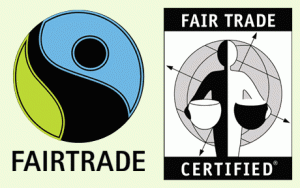Celebrate Fair Trade Month AND Non-GMO Month This October
Shoppers are demanding more: More from their local stores, more from their chosen brands, and even more from the farmers who grow their food.
Transparency in food production and in labeling is critical. Shoppers have a right to know if what they’re buying supports both people and planet.
This October, we celebrate both Fair Trade Month and Non-GMO Month — highlighting two labels you may have seen on your food often and want to know a bit more about.
What is “Non-GMO Project Verified”?
GMOs (or genetically modified organisms) are living organisms whose genetic material has been artificially manipulated in a laboratory through genetic engineering, creating combinations of plant, animal, bacteria, and/or virus genes that do not occur in nature or through traditional crossbreeding methods.
Non-GMO Project verification means that a product is compliant with the Non-GMO Project Standard, which includes stringent provisions for ingredient testing, traceability, and segregation.
What is “Fairtrade Certified”?
Every day, we enjoy products only grown in tropical countries — products like coffee, chocolate and bananas. These farmers and workers often do not earn enough to have a decent living — that is to eat nutritious food, send their kids to school, have adequate shelter and weather a crisis (like COVID-19). Many live on less than $2 per day.
When you see the Fairtrade Mark on a product, you know that farmers were paid at least the cost of production as well as an added Fairtrade Premium to invest in their businesses and communities. You know that child labor was banned and that measures were in place to protect the local environment and water supply. You also know that workers’ rights were upheld and they have the choice to collectively bargain.
Why do we need such labels on food at all?
“Natural” food and “fair” food are big business these days and “greenwashing” has become a serious problem. By making unverified or uncertified claims about how their food is grown or processed (“self-made marketing claims”), some unscrupulous companies capitalize on shoppers choosing to pay a bit more for high-quality food that supports both people and planet. In response, there is a sea of different labels popping up with claims that sound really good, but have little backing them up.
So how does an informed shopper know what’s backed up and what’s empty words? Choosing well-recognized, independent, third-party seals on products is the best place to start. Seals like Non-GMO Project Verified and Fairtrade Certified are rigorous standards with meaningful rules that need to be followed in order to receive the seal. This may actually require laboratory testing and supply chain transparency that allows for “identity preservation.” That typically requires the strict segregation of ingredients that are compliant with the standards from ingredients that are not.
Both the Non-GMO Project and Fairtrade America are nonprofits driven by their missions to change how food is made in order to better serve people and planet. The Non-GMO Project has been verifying products since 2010 and Fairtrade has been operating internationally since 1989. Both nonprofits publish their Standards on their websites to give shoppers transparency, first and foremost. It also helps to check which brands are using these labels: Brands both large and small voluntarily showcase this compliance by including either the Fairtrade or Non-GMO Project seal on their packaging (and in some cases, both seals). This further gives shoppers assurance that it’s not a new fad but a sustainability tool used by brands to have a positive impact on people and planet.
How do Fairtrade and the Non-GMO Project overlap?
The rigorous Fairtrade Standards ban the use of GMO seeds. This is partly because farmers may get stuck in an exploitative cycle when they rely on big agribusinesses for genetically modified seeds, rather than buying seeds from a variety of sources. Furthermore, Fairtrade and others in the field are not yet sure of the impact GMOs may have on the environment, which farmers rely on for their livelihoods.
What you can do
Shop the labels! This store will be highlighting products that are Fairtrade Certified and Non-GMO Project Verified throughout October. Support brands working towards a more sustainable future, and try something new.
Want to learn more?
Get the scoop on Fairtrade. Sign up to receive Fairtrade America’s newsletter and follow them on social media — @FairtradeMarkUS
Follow the Butterfly with the Non-GMO Project. Check out their recipes and like them on social media — @NonGMOProject.



